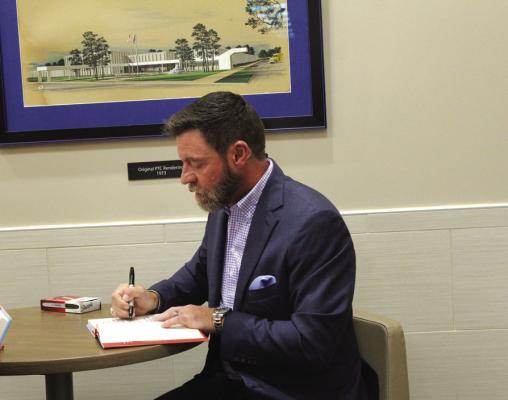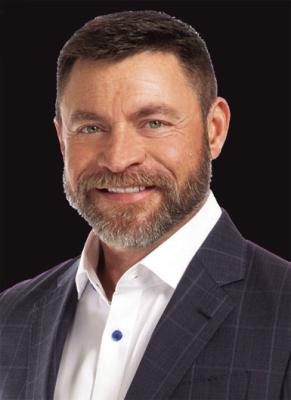Speaker Kevin Brown presents “The HERO Effect” at Pioneer Technology Center
Pioneer Technology Center (PTC) hosted motivational speaker and author, Kevin Brown, at an event on Wednesday, May 24 from 11 am to 1 pm at the PTC Conference Center.
Brown was invited to come speak at PTC after Kelly Johnson, owner/ president of Quality Pools and Spas in Ponca City, attended one of Brown’s speaking events at a convention in Hawaii and was so influenced and touched by the presentation that he felt that Brown needed to come share his message in Ponca City.
Johnson returned to Ponca City and went about finding a venue for Brown to speak at. Pioneer Technology Center was eventually chosen as the location, and a committee was put together to arrange the necessary details. Before long, the event also garnered sponsors including Bobby Garrett, Renfro Family Foundation, First National Bank, Ponca City Development Authority (PCDA), Quality Pools & Spas, RCB Bank, Evans & Associates, and Pioneer Technology Center, whose financial support helped to make the presentation a reality.
Kevin Brown is a highly soughtafter keynote speaker and has spoke to a variety of organizations including American Express, Delta Airlines, PayPal, ExxonMobil, Nationwide, H&R Block, Sprint, Ernst & Young, Million Dollar Round Table, Merck, Booz Allen Hamilton, and many more.
“I never in a million years thought I’d be doing this. I am an introvert by nature, I’m perfectly content behind the scenes,” said Kevin Brown. “But I got pushed onto the stage in my corporate life back in 2002, and something clicked, something happened and my life has never been the same since.”
Brown’s presentation, The HERO Effect, is based upon his book of the same name and focuses on a simple philosophy that separates world-class organizations and high-performance people from everybody else.
His presentation focuses on the heroes in his own life that have shape his own life such as his wife Lisa, and his son, Joshua “Josh-Brown”.
“The heroes in my life, the heroes who helped me. I’ve been homeless more than once, I dropped out of school in the 9th grade, never made it college. I’m the father of a special needs son who is absolutely amazing, and I married a hero. So I started talking about heroes and it took on a life of its own,” said Brown. “I tell people all the time: the story keeps writing itself. It keeps revealing itself to me. When I first started talking about heroes, if you asked anybody on the planet to define a hero, they’d say ‘heroes are ordinary people who do extraordinary things’, and I thought that too when we started. About a year into this journey that we’ve been on, my wife and I realized we were wrong. Heroes are not ordinary people doing extraordinary things, because if you believe that, you have to first convince yourself you are ordinary in the first place. So we changed it. We believe heroes are extraordinary people who chose not to be ordinary. I think everybody was born extraordinary, just a lot of people don’t act like it.”
When Brown started out with his presentation, he would discuss the four principles of the HERO effect: heroes help people…with no strings attached; heroes create an exceptional experience for the people around them; they take responsibility for their life; and they see life through the lens of optimism.
“And [optimism] is a really interesting one for me because I’m not positive by nature. A lot of people out there are “positive thinkers”, and I think they are the great pretenders. Because they look at a problem and they see a challenge, and they look away. They put their head in the sand and they deny it even exists. They say ‘oh, it’s not raining, suns out’, even though it is pouring down rain,” said Brown. “But an optimist, they see what everyone else sees, but they process it differently. They see there’s a problem, they sees there’s a challenge, but they know it is temporary, and they know there is a solution. So they’ve trained themselves to think differently.”
Brown defines optimism as muscle and a skill set that one has to work at.
“The trauma I went through as a kid, I’ve had to put more stuff that is positive into my brain, I have to be around positive people. I read a lot, I listen to audiobooks because I have to work at it. We live in a negative world. We’re bombarded everyday with news, and crisis, and change, and all of the things going on. So I feel we have to be diligent and persistent in putting stuff in our mind, and that’s been a huge takeaway for me,” said Brown. “I can’t stand on stage and give what I don’t have. And the same is true for parenting, and leaders, spouses, significant others. We can’t give what we don’t have and so we have to continually feed our mind, and create new thoughts, new energy, new actions that produce new results. Because the people around us are counting on us to give them new stuff, and when we don’t, they leave us. When we no longer have anything to give them, they leave us. And so, those things keep crystalizing themselves to me, but this optimism muscle is really, really important because how we see the world out there, is exactly what we give back in return. There is an old saying ‘I’ll believe it when I see it’, I think it’s the other way around: ‘I’ll see it, when I believe it’, and so it is what we believe and what we see that we attract to us.”
In his experience, he has encounter people who claim to not be a hero, because many believe that a heroes is someone that does big world changing things, but Brown’s axiom is that heroes just make life better.
“From my perspective, it is just the everyday things we do with good intention. It’s those everyday things we do with excellence. Those are the hero effects,” said Brown. “My wife, a hero to our son, gave up her career to make sure that he got everything that he needed. Sometimes just making lunch for your kid, and making sure they get to school safely, and making sure they get back home…that’s pretty heroic, but we dismiss it. And so, heroes make life better, that’s it. Whatever that looks like at home, at work, in the community. Just make life better. Sometimes you never know when just a kind word, or a smile can brighten someone’s day, lighten the load, and maybe give them a little something they needed that day. You never know when something is going to fall out of our mouth and land on someone’s heart.”
Brown’s presentation has taken him around the world to places as far away as Guatemala and Australia, with some of his presentations seeing crowds that number around 10,000 people.
“I still get really nervous when I take the stage. I said to my wife: ‘do you think that will go away’, because I was actually kind of frustrated by it. And she said ‘you better hope it never goes away’ and I said ‘what do you mean’, and she said ‘the fact that you’re nervous means you still care about the people sitting out there. The minute that you’re no longer nervous, then it’s about you and not about them.’ So I’m okay with the nerves now,” said Brown.
Through his experience in presenting around the world, Brown has come to realize how important it is to share his story, and the effect it has upon those that are dealing with their own struggles.
“I never realized how many people in this world are hurting, struggling, trying to overcome circumstances. And a friend of mine once said to me ‘you never know when your story will become someone else’s survival guide’, and so all of the things I went through as a kid, the things my son has gone through, the things my wife has gone through. That story, as it evolves, as we tell more of it…we get cards, and emails, and letter from people who tell us their story. And they tell us about, may be their kid’s struggling, or their struggle, and in some weird way, I think it gives people permission to not be okay all the time,” said Brown. “And to confront those things that they feel like they need to work on, maybe it’s hurts, past failures, insecurities, all of those things and we never thought that our little story could be a catalyst to find hope and find changes that they wanted to make. I feel an extraordinary responsibility to keep doing this, to keep telling the story, to keep getting better at telling the story. Because if I can make just a little, tiny difference in the world, then I can sleep better at night.”
Those in attendance for the presentation also received a free copy of Brown’s book: Unleashing Your Hero.
“Ponca City is amazing. It is one of the side benefits of this job that is have is that I get to see parts of the world that I would have never seen before. To be able to come to Ponca City and meet, today, with the leaders of Ponca City, Kay County, to talk to leaders that have been here and poured their life into this,” said Brown. To talk to emerging leaders. Sometimes doing our jobs, we lose sight of the impact we actually have. Because work is work a job is a job and sometimes we get lost in the mechanics of the job and lose perspective. You look at everything in Ponca City and Kay County, the progress and economic development, everything that’s happening started with a vision. It started with a plan, people who were committed to this community and each other. And I think that is pretty heroic. I’ve been hanging out in Ponca City meeting heroes everywhere I go, because the truth is they show up in gas stations, grocery stores, classrooms, casinos, restaurants. They show up everywhere, and if we’re looking for them… we’ll find them. But if our heads are down and our thumbs are moving, we’ll miss them.”


